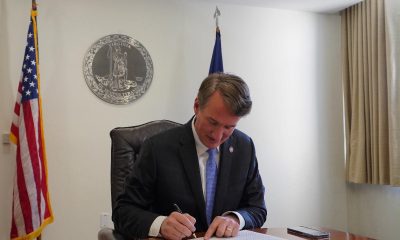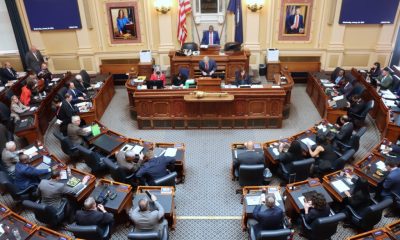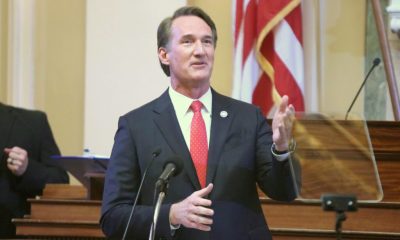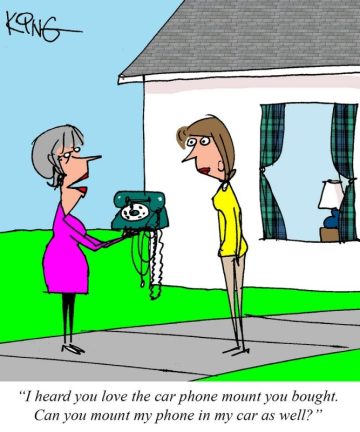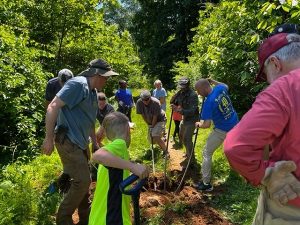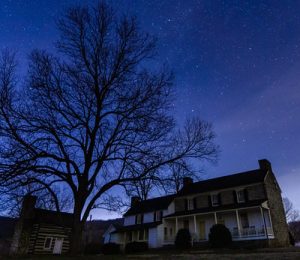State News
Updated: Who might — and who won’t — be returning to the General Assembly next year
This story is an updated and expanded version of our General Assembly Tracker.
In Virginia’s never-sleepy political calendar, April 6 was a red-letter day: the last day for candidates affiliated with a party to file paperwork announcing their intention to run for office in the June primaries.
The primary filing deadline is always a watershed moment for determining who’s likely to be on the ballot in November. But 2023 will see an unusual level of turnover in the oldest legislative body in the Western Hemisphere. Not only is every one of Virginia’s 140 General Assembly seats up for election, but redistricting has radically rejiggered the state’s political landscape.
Beginning this winter, a growing number of senators and delegates began announcing this session would be their last. Some of the announcements were expected. A handful of older, long-term representatives like Senate Majority Leader Dick Saslaw, D-Fairfax, were effectively retiring after years in the legislature.
The 2023 election cycle will be the first under the new legislative maps drawn in the independent redistricting process of 2021. Because those maps gave less protection to incumbents, several lawmakers were drawn into the same district as one or more colleagues. That dynamic is partly fueling the retirement wave, as some lawmakers choose to step down rather than face a primary or compete in a dramatically different district.
Altogether, 28 legislators are waving farewell to the Capitol.
Farewell House … hello Senate?
But it’s not just retirements that will leave vacancies in the General Assembly.
Fourteen delegates have announced their intention to run for the state Senate. Whether they will make it to the Senate isn’t clear, but what is clear is that their departure from the House will further shake up its composition. Here’s who is gambling on being able to move into the upper chamber.
Del. Tim Anderson, R-Virginia Beach
A firebrand conservative who flipped a competitive Hampton Roads district in 2021, Anderson earlier this year said he would not seek reelection in a new district that now includes the Eastern Shore and Del. Rob Bloxom, R-Accomack.
On April 4, Anderson announced on Facebook he will be running for the new Senate District 19, a strongly Republican-leaning district that covers parts of Virginia Beach and Chesapeake.
Del. Lamont Bagby, D-Henrico
Bagby has already left the House to fill out the term of former state Sen. Jennifer McClellan, who was sworn into Congress in early March.
While the eight-year delegate and chair of the Virginia Legislative Black Caucus easily won the contest for McClellan’s seat, he will have to run again this November in a new Richmond-area district laid out in the new maps.
Del. Emily Brewer, R-Isle of Wight
Elected to the House in 2017 in a Tidewater district encompassing Isle of Wight, Prince George, Surry and parts of Suffolk, Brewer chairs the House Communications, Technology and Innovation Committee.
Her race against former NASCAR driver and truck stop owner Hermie Sadler to represent the new Senate District 17 has already provoked a lawsuit over whether the choice of a nominee should occur through a state-run primary or a party-run convention.

Del. Emily Brewer, R-Suffolk. (Photo by Ned Oliver/Virginia Mercury)
Del. Tara Durant, R-Fredericksburg
Durant was first elected to the House in 2021, unseating incumbent Democrat Josh Cole.
The new Senate District 27 seat she’s seeking now to represent parts of Stafford, Spotsylvania and Fredericksburg leans Republican but has a wide-open field of candidates. In a Republican primary, Durant will face Matt Strickland, the owner of a Fredericksburg restaurant that openly flouted COVID-19 restrictions and was raided by Virginia Alcoholic Beverage Control Authority agents.
Del. Elizabeth Guzman, D-Prince William
Guzman joined the House in 2018 after unseating long-time Republican Del. Scott Lingamfelter in a rapidly changing district covering parts of Prince William and Fauquier. In 2020-21, she sought the lieutenant governorship in a crowded primary before fundraising results spurred her to withdraw.
Redistricting left Guzman in the same House district as Del. Luke Torian, who under Democratic control of the House chaired the chamber’s powerful Appropriations Committee. This December, Guzman announced she would challenge Sen. Jeremy McPike for the Democratic nomination in Senate District 29.
Del. Chris Head, R-Roanoke
After representing the Roanoke area in the House of Delegates for 17 years, Head is running for the new Senate District 3 this fall. Sen. Emmett Hanger’s announcement April 6 that he won’t also seek the nomination for the new district clears the path for Head in the firmly Republican area.
Vice Chair of the House Committee on Health, Welfare, and Institutions, Head has pledged “to be a strong conservative voice for traditional Virginia values in Richmond.”
Del. Sally Hudson, D-Charlottesville
An economist who teaches at the University of Virginia, Hudson was elected in 2019 to the House of Delegates, where she has staked out a position in the more progressive wing of the Democratic Party.
She will face long-running Sen. Creigh Deeds in the party’s nominating contest for the Charlottesville-area seat in what’s expected to be one of the most closely watched primaries of the year.
Del. Clint Jenkins, D-Suffolk
Jenkins ousted long-time Republican delegate and former House Appropriations Chair Chris Jones from his Hampton Roads region seat in 2019 after a court-ordered redistricting rejiggered the district’s political makeup.
The new Senate District 17 that resulted from the state-driven redistricting leans Republican. This November, Jenkins — who has no Democratic opponents — will face either Republican Del. Emily Brewer or former NASCAR driver and truck stop owner Hermie Sadler.
Del. Dave LaRock, R-Clarke
A member of the House of Delegates since 2014, LaRock has staked out a position as one of the most conservative members of the House Republican caucus. He participated in the Jan. 6 Stop the Steal rally, although not the storming of the Capitol, and was one of three Republican members of the General Assembly to ask Vice President Mike Pence to nullify Virginia’s election results.
The field of candidates LaRock will face in vying for the party nomination for the strongly Republican Senate District 1 is wide: Seven other candidates have thrown their hats in the ring.
Del. John McGuire, R-Henrico
McGuire was elected to the House of Delegates in 2017. In 2019, he unsuccessfully competed against Del. Nick Freitas, R-Culpeper, for the Republican nomination to run for the 7th Congressional District against Democratic U.S. Rep. Abigail Spanberger. He participated in the Stop the Steal rally at the U.S. Capitol on Jan. 6 but has said he was not part of the attack on the Capitol.
He will face three other Republicans in a nominating convention to represent the strongly Republican Senate District 10 in central Virginia this June.
Del. Danica Roem, D-Manassas
The 2017 victory won by Roem, the first openly transgender person elected to a legislature in the U.S., over self-described “chief homophobe” Republican Del. Bob Marshall to represent the Manassas-area seat catapulted her to national attention. Since then, Roem has been a vocal voice on state transportation as well as LGBTQ-related issues.
She is the only Democrat running to represent the newly redrawn Senate District 30, which is considered competitive.

Del. Danica Roem, D-Prince William. (Ned Oliver/ Virginia Mercury)
Del. Suhas Subramanyam, D-Loudoun
Subramanyam was elected to the House in 2019 and in 2020 joined with Sen. Emmett Hanger to create the Commonwealth Caucus dedicated to increasing bipartisanship in the Virginia legislature.
Immediately after Democratic Sen. John Bell revealed his plans to retire in early March, Subramanyam announced he would run for Bell’s seat in eastern Loudoun County. Former Del. Ibraheem Samirah is also seeking the Democratic nomination for the district.
Del. Schuyler VanValkenburg, D-Henrico
A schoolteacher and outspoken voice among Democrats on education issues, VanValkenburg entered the House in 2018.
With no other Democrats seeking the party nomination in Senate District 16, VanValkenburg is poised to take on Sen. Siobhan Dunnavant, an OB-GYN and leading Republican lawmaker on health issues, in what could be one of the hardest-fought races of November.
Del. Angelia Williams Graves, D-Norfolk
Freshman delegate Williams Graves entered the House in 2021 to fill the seat vacated by the resignation of Del. Joe Lindsey, who was appointed that year to a judgeship by the General Assembly.
In a primary for the new Senate District 21, Williams Graves will face Democratic Norfolk Councilwoman Andria McClellan. No Republicans have announced they will run in the strongly Democratic Hampton Roads district.
Departures
Senate Majority Leader Dick Saslaw, D-Fairfax
Saslaw, who is 83 and will have chalked up 48 years in the General Assembly at the expiration of his term, said Feb. 23 he was closing the book on a political career that began in the House of Delegates and ended up with him ruling the Senate Democrats for 25 years.
“Fish gotta swim. Birds gotta fly. And Saslaw’s gotta move on,” he told the chamber.
Senate Minority Leader Tommy Norment, R-Williamsburg
Norment, who has spent three decades in the Senate and leads that chamber’s Republican caucus, told The Richmond Times-Dispatch in February that he isn’t planning on seeking reelection.
Norment told the paper he wanted to spend more time with family and go back to teaching, which he previously did at the College of William and Mary. Redistricting also left him in the same new district as Sen. Ryan McDougle, R-Hanover.
Del. Eileen Filler-Corn, D-Fairfax
Filler-Corn made history in 2020 when she became the first woman-elected speaker of the House of Delegates. After her party lost its majority in 2021 and she was deposed as the leader of her caucus, she’s leaving the House entirely after more than a decade of serving.
“When I first joined the House of Delegates, I was one of only 19 women in the entire body and one of the only mothers of school-aged children,” Filler-Corn said in a statement announcing her decision not to run for the House in 2023. “Today, our caucus is the first majority woman caucus in Virginia’s history. As the first woman and Jewish Speaker of the Virginia House of Delegates, I proudly appointed more women and diverse individuals to leadership positions than in our entire Commonwealth’s history.”
After redistricting, Filler-Corn ended up in the same Northern Virginia district as Del. Kathy Tran, D-Fairfax, who is now the only Democrat declared for the seat.
Filler-Corn, long considered a possible candidate for statewide office, indicated she’s not quitting Virginia politics entirely.
“We have made significant progress in Virginia and I will continue this work for our communities and our Commonwealth outside the confines of the House of Delegates,” Filler-Corn said. “As for my next chapter, there are many exciting options ahead and I look forward to sharing more in the coming weeks and months.”
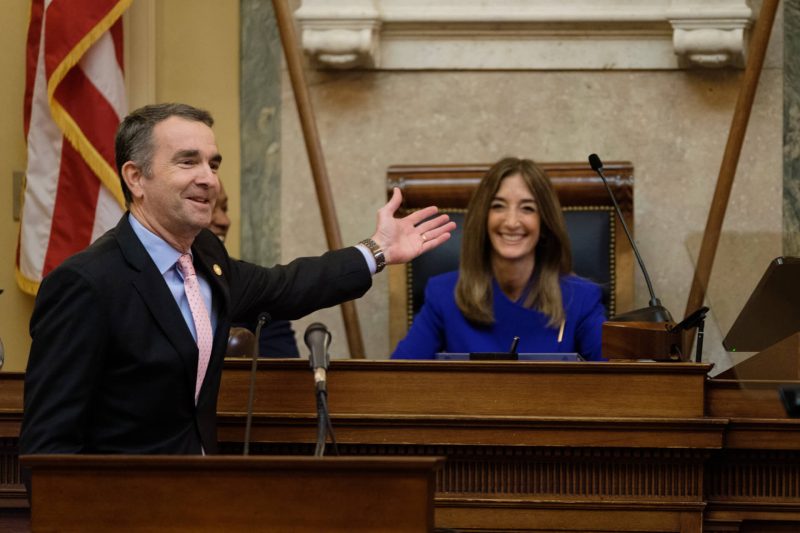
Gov. Ralph Northam introduces House Speaker Eileen Filler-Corn, D-Fairfax, as the first woman to hold the position in state history. (Ned Oliver/Virginia Mercury)
Del. Dawn Adams, D-Richmond
Adams, who was first elected to the House of Delegates in 2017, said in February that she doesn’t plan to run for her seat again and in an April 1 newsletter said she also doesn’t plan to run for the new Senate District 14.
“I know this will come as a shock and perhaps an initial disappointment to many, but please know that I am still considering my next steps,” she wrote. “Despite this announcement, my intention to serve and my commitment to improving the commonwealth remains steadfast. There is still much work I would like to do in Richmond, and I look forward to my next chapter.”
A nurse practitioner, Adams has been especially active on health issues in the General Assembly. This February, she lost a primary bid for the state Senate seat vacated by U.S. Rep. Jennifer McClellan to Lamont Bagby, who was overwhelmingly elected to the position in a March general election.
Redistricting would have pitted Adams against Dels. Jeff Bourne and Betsy Carr in a race to represent the 78th District in the House. Bourne said in February he wasn’t returning to the legislature.
Del. John Avoli, R-Staunton
First elected in 2019, Avoli announced Feb. 25 that he won’t seek reelection in his western Virginia district.
In a news release, Avoli, a former member of the Staunton City Council, said he was “ready to retire after 49 years in public service.” He had previously indicated he would run again, but he told the Staunton News-Leader he had changed his mind. The redrawn district he would have run in is safely Republican.
Sen. John Bell, D-Loudoun
Bell, who joined the Senate in 2020 after several years in the House of Delegates, is not running again in his Northern Virginia district after being diagnosed with prostate cancer.
In a news release, Bell said cancer treatment “will greatly impact my life going forward” while calling his prognosis “very positive.”
“I have a number of excellent treatment options I’m currently considering, and I’m very fortunate to have access to the world-class healthcare that is available in our area,” Bell said. “My doctors tell me that they are confident I will be able to be successfully treated and even cured. I’m thankful that my cancer has been caught so early, and I’m incredibly blessed to have a great team behind me.”
The district Bell would’ve run in is strongly Democratic. Shortly after Bell’s announcement, Del. Suhas Subramanyam, D-Loudoun, announced he would run for the open Senate seat.
Del. Rob Bell, R-Charlottesville
First elected to the House in 2001, Bell announced his retirement Feb. 25, on the last day of the 2023 General Assembly. A former prosecutor, he has been one of Republicans’ leading voices on criminal justice issues, chairing the House Courts of Justice Committee and previously the Virginia State Crime Commission.
Bell was facing the prospect of competing in a significantly bluer district thanks to the new political map for the Charlottesville region.
Del. Jeff Bourne, D-Richmond
Bourne, who was first elected to the House in 2017, said Feb. 20 he wouldn’t run again. While he told The Richmond Times-Dispatch that redistricting played “zero” role in his decision, the new maps would have pitted him against veteran Democratic Del. Betsy Carr in elections to represent the new 78th District.
With a Richmond mayoral election coming up in 2024, there’s been some speculation Bourne, a former Richmond School Board member and City Hall aide, might seek the capital city’s strong mayor job.
“I’m going to enjoy some time with my family,” he said when asked about his future plans. “Then figure out what, if anything, is next.”
Del. Kathy Byron, R-Bedford
Byron told constituents she wouldn’t seek reelection after 26 sessions on Feb. 26.
“Passing legislation gives you a sense of accomplishment,” she wrote in a Facebook post. “Having that legislation succeed in improving people’s lives — sometimes in big ways, other times in small ones — provides a truly humbling gratification.”
Byron currently chairs the House Commerce and Energy Committee and was the first woman to be elected chair of the House Republican Caucus. Under the new political maps, she would have faced Del. Wendell Walker, R-Lynchburg, to represent the district.
Del. Jeff Campbell, R-Smyth
First elected to the House of Delegates in 2013, Campbell said April 1 he will retire from representing his Southwest Virginia district.
“My season has now come and gone,” said Campbell in a release. “When I was sworn into the House in 2014, our family photo, taken in front of the Clerk’s dais, displays a young family with children in elementary school. Ten years later, those children are grown and have gone off to college. If I have any regrets from service, it is that I wasn’t there nearly enough during their formative years.”
Campbell, a lawyer, was one of three GOP members of the House who supported abolition of the death penalty in 2021.
Sen. John Cosgrove, R-Chesapeake
Saying it was time to “pass the torch” to new leaders, Cosgrove announced he’s not running for the Senate again after two decades in the General Assembly.
“I have two precious granddaughters that I rarely get to see, and my wonderful wife Sue has been very patient with me serving so long in public service,” Cosgrove said in his March 20 announcement. “It is time to move on and enjoy my family and the opportunities that may lie ahead for me and my family.”
It wasn’t immediately clear who in the GOP was lining up to try to succeed Cosgrove in the strongly Republican district. A Democrat, Myra Payne, has filed to run for the seat.
Del. Glenn Davis, R-Virginia Beach
In an April 4 announcement, Davis said he wouldn’t run for reelection, describing himself as a casualty of a redistricting process that “created numerous intraparty conflicts across the commonwealth.”
Davis, who has been in the House since 2014 and most recently served as chair of the House Education Committee, had been drawn into the same district as House Appropriations Chair Barry Knight.
“While my desire would be to continue serving the citizens of Virginia Beach in the House of Delegates and leading our education agenda, there is no doubt that the City I represent, as well as the Hampton Roads Region as a whole, has benefited greatly from having the Chairman of Appropriations as its representative,” Davis wrote. “It is for this reason that I will not be running for re-election.”

Del. Glenn Davis, R-Viginia Beach, talks to colleagues on the floor of the House of Delegates. (Ned Oliver/Virginia Mercury)
Del. James Edmunds, R-Halifax
First elected in 2009, Edmunds, who serves as co-chair of the Virginia Legislative Sportsmen’s Caucus, said he’s not planning to seek reelection in his Southside Virginia district.
He was drawn into the same district as Del. Danny Marshall, R-Danville.
In a farewell speech on the floor, Edmunds thanked his House colleagues for putting “humanity” above politics.
Sen. John Edwards, D-Roanoke
Edwards, who has served in the Senate since 1996, is not seeking another term after being put in a Republican-leaning district with Sen. David Suetterlein, R-Roanoke.
“I appreciate the many who have urged me to seek another term,” Edwards said in a news release. “I look forward to continuing my law practice and to spending time traveling and with my family.”
Edwards recently served as co-chair of the Senate Judiciary Committee.
In a statement of his own, Suetterlein praised Edwards for his 28 years in the Senate and said the two have “a shared love of the Roanoke Valley.”
Del. Matt Fariss, R-Campbell
Fariss, who represents a strongly Republican area between Lynchburg and Roanoke, failed to meet the party’s deadline for filing his paperwork to run in the new House District 51, as Cardinal News reported.
First elected to the House in 2011, Fariss is currently facing several charges, including malicious wounding, after a March 2 incident in which a woman who said she had been in Fariss’ car alleges he deliberately struck her with the vehicle. Fariss has denied the allegations and was released on a $7,500 bond.
Del. Wendy Gooditis, D-Clarke
Gooditis, who represents a rural part of Northern Virginia, announced March 1 that she won’t seek another term after her current district was separated into three new ones.
“After three hard-fought elections and six years in office, I feel I have served my time as Delegate,” she wrote in a press release that also called the new district where she resides “well-drawn” and “compact.”
Sen. Emmett Hanger, R-Augusta
Hanger announced his exit from the General Assembly April 6, bringing an end to a long legislative career that began in 1983 in the House of Delegates.
Widely seen as a moderate Republican who has been willing to break with his party in the Senate to side with Democrats on issues such as Medicaid expansion, Hanger found himself in the same district as veteran colleague Sen. Mark Obenshain following redistricting, triggering a drawn-out will-he-or-won’t-he debate in Richmond.
Hanger decided not to run against Obenshain in the new Senate District 2 this winter. Jeff Ryer, a spokesman for Senate Republicans, confirmed April 6 that Obenshain was the only Republican candidate to file for the party’s district primary before the deadline, “making him the Republican nominee in that district.”
On April 6, Hanger also announced he wouldn’t run in the new Senate District 3, about half of which he currently represents and where he would be facing Del. Chris Head in a primary.
“I struggled with this decision because lots of people statewide have encouraged me to run again because of the loss of senior leadership in Richmond that is anticipated next year,” he wrote. “I went so far as to locate a house to purchase in SD3 but ultimately for personal, political and family reasons have decided not to move away from my current community.”
Hanger signaled, however, that he isn’t retiring from politics, noting he “will remain energetically involved” until the end of his term and will keep “all other options open to continue to serve.”

State Sen. Emmett Hanger, R-Augusta.
Sen. Janet Howell, D-Fairfax
Howell, the influential co-chair of the Senate Finance Committee, is retiring after more than three decades in the General Assembly.
“My focus has always been on education, from preschool through graduate school and on helping our neighbors in need,” Howell said in a statement first reported by journalist Brandon Jarvis. “We have made great progress yet much more must be done.”
In recent sessions, Howell has been Senate Democrats’ lead budget negotiator, putting her in a key role to get policy concessions from Republicans as Gov. Glenn Youngkin pushes for tax cuts.
The redistricting process had left Howell in the same Northern Virginia district as Sen. Jennifer Boysko, D-Loudoun.
Del. Kaye Kory, D-Falls Church
After 14 years in the House of Delegates, Kory announced on April 3 that she had made the “difficult decision” to retire at the end of her term.
Kory, who had been drawn into the same legislative district as Del. Marcus Simon, D-Falls Church, said her husband was “facing some health challenges to which I want to devote my full attention.”
“I am grateful to him and to my children for making our home a team environment that empowered me to pursue public office, and now I want to be there for them,” she said.
During her time in the House, Kory founded the Women’s Health Care Caucus, and she was also active on animal welfare and developmental disability issues.
Sen. Lynwood Lewis, D-Accomack
One of the Senate Democrats most imperiled by redistricting, Lewis announced he won’t run against Sen. Bill DeSteph, R-Virginia Beach, in a significantly redder district.
Lewis has served in the Senate since 2014, when he narrowly won a special election for the state Senate being vacated by former Gov. Ralph Northam, who at the time had just been elected lieutenant governor.
In a statement announcing his decision, Lewis noted he has represented “vastly different” parts of the state in a district that extended from Norfolk to the rural Eastern Shore.
“In all my years of service, I always sought common ground even in times of turmoil, and I believe the opportunity to serve such a diverse district made me a better legislator and a better person,” Lewis said.
Lewis said he’s hopeful there will be “other opportunities to serve” in his future.
Another Democrat, Victoria Luevanos, has filed to run in the district.
Sen. Jennifer McClellan, D-Richmond
After 17 years in the General Assembly, McClellan departed the legislature this winter to fill the 4th Congressional District seat left vacant by the death of U.S. Rep. Donald McEachin in November. After defeating Republican pastor Leon Benjamin in a Feb. 21 election, she became the first Black woman to be elected to Congress from Virginia.
A corporate attorney who has backed progressive causes like combating climate change and protecting abortion access, McClellan also ran for governor in 2021 but came in third in the Democratic primary. The candidacy ultimately went to former Gov. Terry McAuliffe, who lost the race to Gov. Glenn Youngkin.
Del. Mike Mullin, D-Newport News
An influential voice on courts and criminal justice issues, Mullin isn’t running again after redistricting left him in a Republican-friendly district that would be tough for any Democrat to win.
Mullin, who was first elected to the House in 2015, said he planned to spend more time with his family.
Tragedy struck shortly after his announcement as Mullin announced the death of his 3-month-old son, news that left some General Assembly members visibly shaken as they finished up their work for the year.
Del. Kathleen Murphy, D-Fairfax
First elected to the House in 2015, Murphy was drawn into a Northern Virginia district with Del. Rip Sullivan, D-Arlington.
“I really don’t know what the words should be. I’m going to miss you,” Murphy said on the House floor as she announced her decision to leave.
After losing a brother to gun violence, Murphy has been one of House Democrats’ top advocates for stronger gun control laws.
Sen. Steve Newman, R-Bedford
Newman announced his retirement in mid-March in a Facebook video and news release.
“This is a bittersweet time for me and my family,” Newman said in the release. “It’s bitter because I’m leaving an institution I love and the individuals in the Senate and on my staff that have worked with me to better serve Central Virginia. But it’s a sweet time because I know I will be able to now spend more time with my family, friends, and business.”
Newman has served in the Senate since 1996. His time included a recent stint as president pro tempore, the highest leadership position elected by the body that mostly involves presiding over the Senate when the lieutenant governor is absent.
Newman had been drawn into the same Lynchburg-area district as Sen. Mark Peake, R-Lynchburg, who now has a clearer shot at running for the strongly Republican seat.
Del. Ken Plum, D-Fairfax
Plum, who with 44 years in the House of Delegates is the longest-serving member of the chamber, said Feb. 22 he was hanging up his hat.
“I entered politics and the House of Delegates to fulfill a lifelong dream that Virginia could do better than being a backward Southern state and could fulfill the dreams expressed by our Founding Fathers who were Virginians,” Plum wrote in an announcement of his retirement on Patch. “We have made significant strides, but as the current session of the General Assembly has shown we need to be vigilant and continue our efforts.”
Del. Margaret Ransone, R-Westmoreland
Ransone, the current chair of the House Privileges and Elections Committee, announced via Facebook that she won’t seek another term representing her Northern Neck-based district.
“My love for community will never change,” Ransone wrote, adding that she was planning to spend more time with family after about a decade in the legislature.
Ransone was first elected in 2011. No other candidates had filed to run against her at the time of her announcement.
Del. Roxann Robinson, R-Chesterfield
First elected to the House of Delegates to represent the Richmond-area district, Robinson has served in senior Republican positions such as chair of the House Finance Committee.
Her Feb. 24 announcement that she won’t run again was something of a surprise. Although some of her more recent election victories were tight — she defeated a challenger by less than a percentage point in both 2017 and 2019, as reported by The Chesterfield Observer — her redrawn district had altered the landscape. Robinson had declared she intended to run last May and was poised to take on two other Republican candidates in a three-way primary.
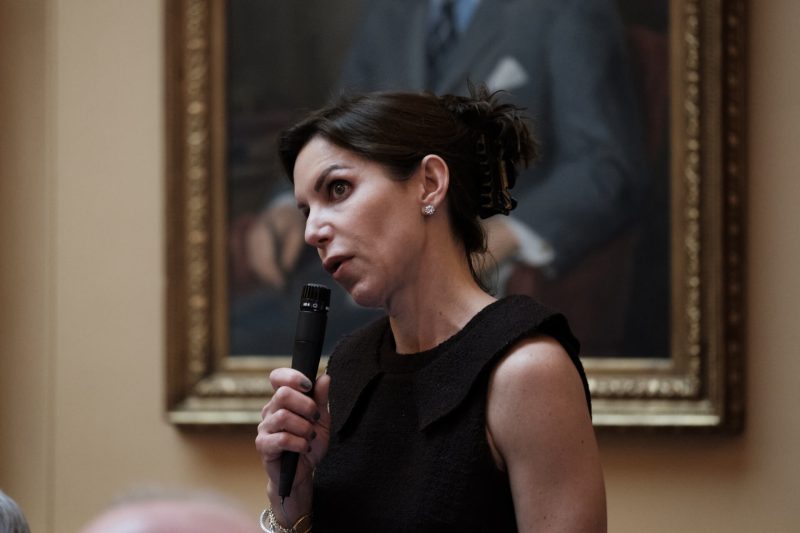
Sen. Jill Vogel, R-Fauquier, speaks on the floor of the Virginia Senate. (2020 Photo by Ned Oliver/Virginia Mercury)
Sen. Jill Vogel, R-Fauquier
Vogel announced late this January that she won’t seek another term after serving in the Senate since 2008.
“Anyone who makes that decision and says that they are not sad is not telling the truth!!” Vogel said on Twitter.
Vogel, the first woman to give birth to a child while serving as a member of the General Assembly, was the Virginia GOP’s nominee for lieutenant governor in 2017. She lost that year to former Democratic Lt. Gov. Justin Fairfax, but outperformed other Republicans on the statewide ticket.
In a recent interview with The Winchester Star, Vogel indicated changes to her district were a factor in her decision.
Del. William Wampler, R-Washington
Wampler, a member of a prominent Southwest Virginia political family who began serving in the House of Delegates in 2020 after a vigorous primary, said April 6 he doesn’t plan to run again in his strongly Republican district.
“While it is difficult to wrestle with the fact that our region has a declining number of representatives that will be returning to the General Assembly next term, I am confident in the leadership we have in place and in their ability to work with other leaders across the state to address our priorities,” he said in a statement.
Wampler had been drawn into the same district as Del. Israel O’Quinn, R-Washington.
Other potential departures
Two primary races pitting incumbents against each other — a byproduct of redistricting — will also ensure one current senator and one current delegate won’t be a part of next year’s General Assembly.
In the Hampton Roads region, Democratic Sens. Louise Lucas and Lionell Spruill are battling for the party nomination to represent the new Senate District 18. The district, which includes parts of Chesapeake and Portsmouth, leans Democratic and has no declared Republican candidate, meaning whichever wins the primary is virtually assured election to the seat.
In Southwest Virginia, Dels. Marie March and Wren Williams, both staunch conservatives, are fighting for control over the strongly Republican House District 47. Both candidates are also freshman legislators, and their race has drawn attention statewide because of the acrimony they have displayed toward each other, culminating in March pressing charges against Williams for alleged “shoulder slamming” at a local fundraiser.
by Sarah Vogelsong, Virginia Mercury
Virginia Mercury is part of States Newsroom, a network of news bureaus supported by grants and a coalition of donors as a 501c(3) public charity. Virginia Mercury maintains editorial independence. Contact Editor Sarah Vogelsong for questions: info@virginiamercury.com. Follow Virginia Mercury on Facebook and Twitter.
State News
Youth Violence Prevention Program Funding Hangs in the Balance as Legislature Reworks State Budget
Two Virginia school divisions are slated to launch a pilot program intended to help reduce youth involvement in gangs and violent behaviors with guns but it’s unclear if the initiative will be fully funded, as lawmakers go back to the drawing board to work up a new state spending plan.
On April 2, Gov. Glenn Youngkin signed legislation to create the Community Builders Pilot Program that will start with Roanoke and Petersburg City Public Schools students entering the eighth grade. Pupils in both districts face high rates of gun violence and cases of students bringing firearms to school.
Bill carriers Sen. Lashrecse Aird, D-Petersburg, and Sam Rasoul, D-Roanoke, said unlike other community violence intervention efforts centered around getting weapons off the streets, their legislation takes a different approach because it centers students.
“We’re hoping by involving young people that perhaps it helps in other ways,” said Aird, adding that such a program could also have a “residual impact” on children facing disciplinary trouble in school.
“But ultimately, [this legislation] is specifically trying to make sure that when they are no longer in school, they have another outlet that’s pouring into them and they’re not getting involved in things that can be harmful to themselves and others when they are outside of the school walls,” she said.
If the program is successful, Rasoul — who serves as the chair of the House Education Committee — said he hopes it will expand to other schools and grade levels.
“This is a great way to keep students focused, especially through the summer, and to build some healthy habits with a very specific curriculum that then follows them throughout their eighth grade year,” said Rasoul.
According to the pilot program legislation, the initiative will provide community engagement, workforce development, postsecondary education exploration, social-emotional education and development opportunities to students during the academic year after regular school hours and during the summer months.
Schools will collect data and report the program’s progress to the governor’s administration and General Assembly every November for the next two years.
Public interest in youth gun violence prevention has increased, most notably after a then-six-year-old student brought a firearm from home to his Newport News elementary school last year and shot his teacher. The teacher, Abigail Zwerner, was seriously injured but survived.
The Community Builders program might have scored a legislative win, but funding for the program will remain unclear until the governor and leaders from the General Assembly determine the final budget before the June 30 deadline.
Virginia legislature will consider reworked state budget in May 13 special session
The General Assembly backed the pilot program with $800,000 in dedicated funds over the next two years. However, the governor amended the budget, cutting the request to $400,000. It’s an example of the governor’s and the General Assembly’s differing opinions on how the commonwealth should be funded for the next two years.
Del. Mike Cherry, R-Colonial Heights, who supported the Community Builders legislation, said during the Jan. 30 House Education subcommittee hearing that he believes it to be a “great model program” and would work well with Ceasefire Virginia in supporting communities facing high levels of crime.
In 2022, Ceasefire was launched as a multi-jurisdictional approach to address violent criminal activity among serious and repeat offenders in partnership with Virginia’s attorney general’s office, elected officials and law enforcement.
The purpose of the initiative is to reduce violent crime through partnerships and investments into gang prevention and community policing. Ceasefire has been implemented in 13 cities statewide, including Petersburg and Roanoke.
“When you ask high school students ‘When did things start to go wrong?’ many times they will point to the middle school level,” Verletta White, superintendent of Roanoke City Public Schools, said during a Jan. 30 House Education subcommittee hearing.
“We want to target our rising eighth graders and show them not only the detrimental effects of violence on a community, but their responsibility and how they can be community builders instead.”
by Nathaniel Cline, Virginia Mercury
Virginia Mercury is part of States Newsroom, a nonprofit news network supported by grants and a coalition of donors as a 501c(3) public charity. Virginia Mercury maintains editorial independence. Contact Editor Samantha Willis for questions: info@virginiamercury.com. Follow Virginia Mercury on Facebook and Twitter.
State News
Virginia Legislature Will Consider Reworked State Budget in May 13 Special Session
Gov. Glenn Youngkin and lawmakers have agreed to work together on the biennium budget, after clashing for weeks over two distinctly different spending plans.
A special session will be held on May 13, Youngkin and lawmakers in both chambers announced Wednesday, to consider the revamped budget and prevent a shutdown ahead of July 1, when the current budget expires.
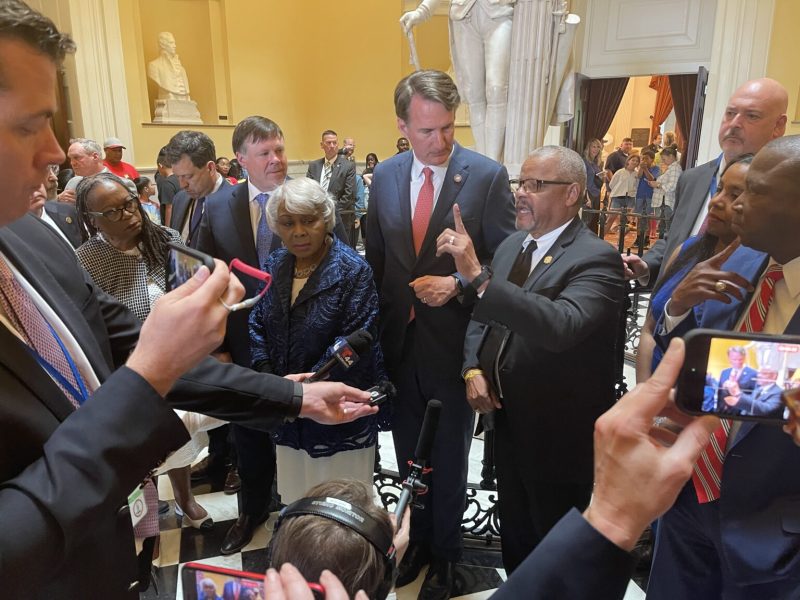
Gov. Glenn Youngkin was joined by Democratic and Republican leaders from both chambers in the Capitol’s rotunda on April 17. (Nathaniel Cline/Virginia Mercury)
On Wednesday, the House of Delegates voted to reject all 233 of the governor’s amendments to the budget, and agreed to seek a new budget to present to the legislature May 13, with voting on it expected May 15. They also took up the governor’s other bill amendments and 153 vetoes.
The House accepted all Youngkin’s vetoes, including bills that would have raised the minimum wage, created a Prescription Drug Affordability Board to cap drug prices, protected people who come to Virginia for reproductive health care from extradition and prohibited assault firearms in public places.
Future of skill games in Virginia still unclear as Senate rejects Youngkin’s proposal
The bill amendments up for debate included: changes to legislation that would legalize skill machines, which was rejected by the Senate; a measure that would lower the amounts Dominion Energy and Appalachian Power Company can recover from customers for their pre-construction costs of a small modular reactor, which was adopted in their respective chambers; and another that would require school boards to notify gun-owning parents annually of their responsibility to safely store firearms to keep them away from their children, which was also rejected by the delegates.
It’s not clear what will happen to the language the legislature included in its budget that would’ve ordered the state to rejoin the carbon market known as the Regional Greenhouse Gas Initiative, or RGGI, that incentivizes electricity producers to emit less carbon by making them purchase allowances to do so.
Youngkin — who passed a regulation that withdrew Virginia from RGGI despite RGGI supporters saying a legislative change was needed — has opposed participation in RGGI, while calling the fee for the allowances that utilities can recover from ratepayers a “hidden tax.” The regulation withdrawal is being challenged in court.
The budget delay also creates uncertainty for local governments trying to estimate how much funding schools will receive and the Washington Metropolitan Area Transit Authority, or Metro, which is seeking additional funding from the state to bridge its $750 million shortfall.
Before Wednesday’s veto session, the governor tried compromising on the budget with lawmakers by removing all tax increases they had approved — including the digital service sales tax he initially proposed — but also dropping the tax cuts he requested in December.
In the Capitol’s rotunda with Democratic and Republican leaders from both chambers Wednesday afternoon, Youngkin said all parties are close to a budget agreement after meeting over the last few days.
“We believe this is a good path forward for the commonwealth,”Youngkin told reporters. “It reflects the work that has been done from the General Assembly and from the governor’s office.”
He added that no decisions have been made yet on the specifics of the budget, including tax increases, but he looks forward to meeting with leaders.
“This was a collective decision, and you will see from the vote this morning that it is unanimous amongst all of us to press forward in this fashion,” Youngkin said.
House Appropriations Committee Chair Luke Torian, D-Prince William, added, “We agreed that there is nothing that’s off the table. Everything will be up for discussion and deliberations. No decisions have been made at this point.”
Senate Finance and Appropriations Committee Chair Louise Lucas, D-Portsmouth, told a reporter that they were “absolutely correct” that envisioning the governor, Democrats and Republicans standing together in the rotunda two months ago was unlikely to happen when there were different budget priorities on both sides, including Youngkin’s arena proposal to bring two professional sports teams to Northern Virginia and the Democratic-controlled legislature’s plan to raise the minimum wage and allow retail cannabis sales in the state.
“But I think what’s changed is that there has been a lot of collaboration,” Lucas said. ”I think nothing helps the process more than everybody getting together, sitting around the table and talking about what we can all do to help Virginia. I think we all had different ways we thought we were going to get there, but I think now we are going to work together towards something that will keep the temperature down a little bit.”
Sen. Ryan McDougle, R-Hanover, who, along with Lucas, met with the governor earlier this week, said he is optimistic about the process moving forward.
“That’s how you come to a resolution,” McDougle said. “Everybody’s got to come to the table and talk and be heard and once you do that you can find solutions.”
by Nathaniel Cline, Virginia Mercury
Virginia Mercury is part of States Newsroom, a nonprofit news network supported by grants and a coalition of donors as a 501c(3) public charity. Virginia Mercury maintains editorial independence. Contact Editor Samantha Willis for questions: info@virginiamercury.com. Follow Virginia Mercury on Facebook and Twitter.
State News
Future of Skill Games in Virginia Still Unclear as Senate Rejects Youngkin’s Proposal
The fate of slots-like skill games in Virginia convenience stores and truck stops remained in limbo Wednesday as the state Senate voted to reject Gov. Glenn Youngkin’s sweeping changes to a proposal to legalize and tax the gambling machines.

Sen. Aaron Rouse, D-Virginia Beach, spoke to reporters at the Capitol while surrounded by skill game supporters who back the legalization bill he’s sponsoring. (Graham Moomaw/Virginia Mercury)
The Senate voted 34-6 to reject the governor’s tougher amendments to the bill, sending the legislation back to Youngkin in its original form.
Virginia lawmakers return to Richmond as budget battle fuels shutdown talk
The bipartisan move raises the risk Youngkin could veto the legislation, an outcome that would leave skill games prohibited throughout Virginia by a ban enacted under former Gov. Ralph Northam. But lawmakers also announced Wednesday that they’re planning a special session later this spring to reach a deal on the state budget, creating an opening to reconsider the skill game issue over the next few weeks.
“I recognize that this bill faces an uncertain future if it goes back to the governor’s desk,” said Sen. Aaron Rouse, D-Virginia Beach, the bill’s lead sponsor in the Senate. “But… I stand with small businesses in every corner of our commonwealth urging the governor to do right by small businesses and sign this bill.”
Virginia’s skill game ban — which was passed in 2020 but didn’t take effect until 2021 after lawmakers gave the industry a one-year grace period due to COVID-19 — was suspended for nearly two years as the skill game industry fought it in court. The Supreme Court of Virginia reinstated it late last year, rendering the machines illegal and prompting the industry to launch a new lobbying push to change the law.
Things appeared to be going well for skill game supporters until the bill got to Youngkin, who had signaled in February that he had “serious concerns” with the proposal. Last week, the governor unveiled amendments that would impose a higher tax rate on the machines, more regulatory safeguards and strict geographic limits that would effectively ban the machines in most of the state’s metro areas.
The governor wanted a 35% tax rate on the machines, while the General Assembly approved a 25% tax rate. Skill game supporters claim Youngkin’s amendments would create a tax rate of up to 45%, but the administration has said that’s a misread of the bill and the suggested rate is indeed 35%.
In a statement Wednesday evening, Youngkin’s office reiterated its qualms about the legislation while indicating the governor is open to revisiting the geographic limits skill game backers took issue with.
“The governor’s concerns with the bill remain and his amendments addressed those concerns,” said Youngkin spokesman Christian Martinez. “He is open to continuing discussion to alleviate issues with both perimeter provisions.”
Proponents of legalizing skill games have portrayed it as a matter of fairness, arguing that since Virginia has legalized numerous other types of gambling there’s no reason the machines that generate revenue for small business owners should be treated more harshly. Opponents of the bill say the state shouldn’t allow a gambling free-for-all or reward businesses that exploited a legal loophole to profit from gambling machines that have been unregulated and untaxed for most of their existence in Virginia.
The Senate appeared to consider a second vote on the skill game bill to preemptively override a potential veto. But the body didn’t follow through on that effort, which would have required two-thirds votes in both legislative chambers. The House of Delegates, which had approved the skill game bill by a narrow 51-45 margin, didn’t take up the skill game bill Wednesday. Because the bill originated in the Senate, the Senate’s decision to reject Youngkin’s amendments sent the bill straight back to the governor.
The policy specifics of what the governor recommended drew little discussion in the Senate, which completed its action on the skill game bill Wednesday in about five minutes.
Rouse, the only senator who spoke on the bill, said the “most egregious” elements in Youngkin’s proposal were the geographic limitations that would outlaw the machines in the state’s most populous regions. Youngkin’s version of the bill would have prohibited skill games within 35 miles of licensed casinos and Rosie’s facilities affiliated with the Colonial Downs horse racing track. The governor also suggested banning skill games within 2,500 feet of schools, day cares and places of worship.
In a seemingly less controversial amendment, Youngkin proposed giving cities and counties the ability to ban skill games locally. The bill sent to him had no provisions for local control, legalizing the machines statewide with no ability for communities to opt out.
The governor had also suggested tougher regulations requiring the industry to verify the identity of players before they put money into the machines, a system that could help prevent minors and people seeking help for gambling addiction from playing skill games. The bill the legislature passed also bars people under 21 from playing and has provisions for gambling addiction, but was less clear on how those rules would be enforced since skill games aren’t as closely supervised as slot machines on a casino floor.
Del. Paul Krizek, D-Fairfax, a skill game critic who has pushed for tougher regulations on the industry, said the legislature could have avoided a veto by rejecting the 35-mile rule while leaving the rest of Youngkin’s suggestions.
“I’m a big believer that half a loaf is better than no loaf,” Krizek said. “I’m sure there’s things that the governor could meet them halfway on.”
A large group of convenience store owners gathered at the Capitol Wednesday morning to applaud lawmakers seen as skill game allies and criticize Youngkin for amendments they felt were overly harsh and not in tune with reality.
Convenience stores shut down Virginia Lottery sales in protest for skill games
Munir Rassiwala, who owns several convenience stores around Virginia, said he voted for Youngkin but was disappointed the governor seemed to think protecting the investments casinos have made is more important than helping smaller entrepreneurs like him.
“There should be a compromise,” he said. “There are lives at stake.”
Sen. Bill Stanley, R-Franklin, a skill game supporter, encouraged the crowd to keep up the fight.
“Hopefully cooler heads prevail both in the governor’s office and here in the legislature,’ said Stanley, a lawyer who has done work for Pace-O-Matic, a major skill game company lobbying for the legalization bill. “I think ultimately a solution for the budget and for skill games is in the works.”
Virginians Against Neighborhood Slot Machines, an anti-skill game advocacy group funded by casinos, urged Youngkin to veto the bill.
“That is the only course of action to ensure public safety, protect vulnerable communities and to prevent every neighborhood in Virginia from becoming a mini-Las Vegas,” the group said in a statement. “It should tell Virginians everything they need to know that ‘skill games’ proponents threw a tantrum at the mere prospect of modest regulatory protections.”
by Graham Moomaw, Virginia Mercury
Virginia Mercury is part of States Newsroom, a nonprofit news network supported by grants and a coalition of donors as a 501c(3) public charity. Virginia Mercury maintains editorial independence. Contact Editor Samantha Willis for questions: info@virginiamercury.com. Follow Virginia Mercury on Facebook and Twitter.
State News
Youngkin Proposes Uing NoVa Investment Fund to Support Metro
In a state budget amendment, Gov. Glenn Youngkin pledged to support Metro with an additional $133.7 million amid a projected shortfall for the transit agency. The pledge came with a caveat: It would strip funding from a transit investment fund used by Northern Virginia jurisdictions.
Leaders from the Northern Virginia Transportation Commission, the regional body of jurisdictions responsible for funding Metro, urged lawmakers to reject the amendment.
“The General Assembly worked hard and came to [a] compromise, and we believe it’s the right thing to do to reject the amendment and then re-engage with the administration to find common ground and this is not something that we believe the governor is ideologically opposed to,” said Matt de Ferranti, commission chair.
Last week, the governor announced his pledge after the Washington Metropolitan Area Transit Authority, which operates Metro, projected a $750 million shortfall next fiscal year, starting during the summer. In Youngkin’s initial budget proposed in December, he did not include any additional funds for the transit agency.
Since then Virginia’s jurisdictional partners Maryland and the District of Columbia have committed millions to Metro. D.C. has committed up to $200 million, and Maryland is pledging $150 million.
In 2018, the three jurisdictions established a dedicated funding source for Metro to help address any maintenance issues. The Virginia General Assembly created the WMATA Capital Fund to uphold its portion of the agreement.
In December, the governor told reporters that Metro must create a plan to address the change in ridership and service demand before any additional funding is appropriated.
The governor’s proposal
Youngkin’s proposal is less than the $149.5 million proposed by lawmakers, who did not intend to use funds from NVTC.
According to the budget amendment, Virginia would provide $35.7 million from the general fund to NVTC in fiscal year 2026 to support operating assistance for Metro, in addition to the $98 million supplemental allocations held by NVTC.
The commission said in an April 12 letter to lawmakers that the $98 million was given under previous Democratic Gov. Ralph Northam’s administration for the localities to use to address the immediate Metro payments as the country emerged from the pandemic.
Under the governor’s amendment, the letter said, the commission would be required to pay its normal Metro operating bill, which is approximately $340 million, and an additional increase of $119 million in fiscal year 2025.
The funds would have helped with matching the General Assembly’s allocation to address the projected two-year, $263 million increase in Virginia’s Metro bill: $119 million in fiscal year 2025 and $144 million in 2026.
The letter states that the governor’s intended action would place an overly “disproportionate burden” on local budgets in the counties of Arlington, Fairfax and Loudoun, and the cities of Alexandria, Fairfax and Falls Church, who would “need to look to taxpayers a second time, beyond the existing local investments already being made in Metro.”
If the NVTC Trust Fund was exhausted, de Ferranti said, it would delay funding road and bike lane projects in the region.
As part of the governor’s plan, additional funds to the transit agency could increase depending on whether Metro meets the administration’s proposed criteria, including hiring a consulting firm to help the transit agency save money and to review how it is managing funds.
The firm would be required to submit its findings to WMATA by Nov. 30, as well as to the governor, and the chairs of the House and Senate Appropriations committees.
Metro will also be required to provide a management plan to the state for approval by Jan. 15, 2025.
The commission wrote it is concerned about the “procedurally complex and overarching reporting and approval conditions” for the agency Metro on top of other regional efforts.
“Adding more steps beyond the oversight requirements contained in [the] existing code would undo efforts to have clear lines of authority and add financial uncertainty to the flow of funding, disproportionately affecting NVTC and its jurisdictions,” the letter reads.
Helping Metro
Last week, Metro joined the Metropolitan Washington Council of Governments in announcing the launch of a new joint initiative to create a “unified vision” for transit service in the region as Virginia lawmakers weigh the governor’s proposal and conditions.
The initiative comes after the jurisdictions learned more about Metro’s financial challenges to maintain services. Council members also expressed interest in identifying funding and accountability solutions, both in the near and long terms.
“Our public transit network is our region’s most significant, shared asset,” said Clark Mercer, executive director for COG, who added he was pleased leaders are “seizing this valuable opportunity to collaborate and ensure the region’s public transit is positioned for long-term success.”
Council suggests Virginia reset subsidy payments to Metro amid budget shortfall
Randy Clarke, Metro’s general manager and chief executive officer, said on Friday’s The Politics Hour radio show that he expects the Board of Directors to vote on its budget next week, which avoids those “draconian” service cuts.
According to Metro, some of the agency’s proposed changes include eliminating bus service on 67 of 135 lines, reducing bus service on 41 of 135 lines, a 20% general increase in fares and parking rates, reducing rail service and closing 10 stations.
Nearly two dozen groups, including the Coalition for Smarter Growth, Virginia Bicycling Federation and the Southern Environmental Law Center, signed a statement urging lawmakers to reject the governor’s amendment and restore the funding approved by the General Assembly.
“Failure to provide additional state funding will have dire consequences for the workforce and economy of Northern Virginia and the D.C. region,” the April 12 statement reads. “It would mean massive service cuts and fare hikes at Metro, higher transportation costs for workers, and more congestion on the roads, and discourage next generation companies and workers from locating in the D.C. region.”
While Clarke shied away from commenting on the governor’s decision to pledge less than what the General Assembly voted on, he did say that the current funding model is “complex” and “non-traditional” in the transit industry, which prevents the agency from being able to fully predict its ongoing service needs in Virginia, Maryland and D.C.
“The fact that we kinda go through this every other year is unhealthy for Metro. [Metro] can’t do good service planning, workforce planning, capital fleet planning,” Clarke said.“It’s also is not good for our jurisdictional partners.”
According to NVTC, Metro has continued to be a “key economic driver” for the commonwealth, generating $1 billion in state tax revenue annually.
by Nathaniel Cline, Virginia Mercury
Virginia Mercury is part of States Newsroom, a nonprofit news network supported by grants and a coalition of donors as a 501c(3) public charity. Virginia Mercury maintains editorial independence. Contact Editor Samantha Willis for questions: info@virginiamercury.com. Follow Virginia Mercury on Facebook and Twitter.
State News
‘Panicked Rush to Gas’ Could Hike Energy Costs, Report Warns Regulators
The nation’s largest public power company, the Tennessee Valley Authority, which serves 10 million people in Tennessee and parts of six neighboring states, has put forward plans for eight new natural gas plants since 2020.
In South Carolina, Dominion Energy and Santee Cooper are pushing the state legislature to pave the way for a 2,000-megawatt natural gas power plant. Farther north, Dominion also plans new gas generation in Virginia. In its most recent plan filed with state regulators, Georgia Power is looking to add new gas turbines. Likewise, Duke Energy in North Carolina is proposing new gas plants and delaying coal power retirements.
The companies point to spiking electric demand, driven by data centers, new manufacturing facilities, increasing transportation electrification and other sources.
Georgia Power’s CEO said new businesses are creating a thirst for new power at “both a record scale and velocity.” Duke and TVA both cited “tremendous” economic and population growth in their service areas.
But a new report by an energy and climate policy think tank warns that some utilities, particularly in the South, are making a “panicked rush to gas” and calls on state officials to explore cheaper options and carefully vet plans that could saddle electric customers with billions in costs.
”What we really want is for policymakers to ask good questions,” said Eric Gimon, a senior fellow at Energy Innovation, and one of the authors of the brief for utility regulators, in an interview with States Newsroom.
‘Less risky alternatives’
After about 15 years of stagnation, U.S. electric demand is growing. A December report by an electric sector consulting firm noted that the utilities and regional transmission organizations that run the North American electric grid had almost doubled growth projections. At the same time, transmission line construction has nearly ground to a halt and there’s limited ability to move power between regions as the generation mix increasingly shifts to renewables and batteries in many parts of the country.
That’s been coupled with a growing dependence on natural gas power plants, which have taken the role coal used to play in the nation’s power mix but which have also failed in large numbers during recent severe weather.
Gimon said gas plants are often treated as a magic bullet solution to resource adequacy — an electric industry term for having enough power to meet peak demand. If the vision of the utilities pushing for lots of new gas power comes to pass, one of two things will happen, Gimon contends.
“Either they don’t get used very much,” he said, and thus become a stranded asset customers are stuck paying for anyway. “Or they get used a lot and they’re busting through their climate goals and EPA regulations.” In a post Thursday, two Natural Resources Defense Council staffers warned that the huge planned Southeastern gas buildout will jeopardize emission reduction targets and hike electric costs, “leaving customers on the hook for potentially expensive, dirty and ultimately stranded assets that may or may not be usable for their typical, carbon-intensive lifespans.”
Gimon and one of his co-authors, Mike O’Boyle, Energy Innovation’s senior director for electricity, also pointed out that gas plants can’t always be counted on when they’re needed most. In the region run by PJM, the nation’s largest grid operator, gas plants accounted for 70% of the power plant outages it suffered during Winter Storm Elliott in December 2022.
“We’re not talking about a capacity resource that is dependable for 100% of its nameplate capacity during a winter peak either,” O’Boyle said. “I think regulators’ jobs are to help ensure that utility investments are prudent and part of that means have they considered more affordable alternatives and less risky alternatives.”
Sarah Durdaller, a spokesperson for the Edison Electric Institute, which represents investor-owned utilities like Dominion Energy, Southern Company and Duke Energy, said its member companies “are committed to delivering reliable, affordable and resilient clean energy to their customers.”
Durdaller said carbon emissions from the power sector are at their lowest point in almost 50 years, despite electricity generation doubling in that time frame. Natural gas power, she said, “is an essential partner for deploying renewables and maintaining grid reliability.”
As far as the thousands of megawatts of gas plants companies are proposing, she said that utility plans “always evolve as new technologies emerge, as costs decline, as demand forecasts change and as new policies are fully implemented.”
‘Better solutions’
One aspect for policymakers to consider is the reliability of the demand projections themselves.
“Utilities consistently over forecast,” said Gudrun Thompson, a senior attorney at the Southern Environmental Law Center, which has been tracking southeastern utilities’ gas plant proposals. “I would not be surprised if that is happening now.”
Transparency is also a concern, she added, noting that a single data center project could be in negotiations with multiple utilities and get counted by all of them in their load projections.
In 2007, the U.S. Energy Information Administration predicted 1.5% annual growth in electric demand, which would have been a 21% increase over 15 years. It never materialized, mostly because of energy efficiency programs, federal and local building codes and appliance standards and voluntary industry efforts, the Energy Innovation report says.
“Efficiency was a primary cause of flat demand after 2008 and could be a major factor in
mitigating the pressure that new demand growth puts on the electrical grid,” the report notes.
Coming electric load increases aren’t illusory but the report’s authors argue that “better near-term and long-term solutions exist and should be deployed first.”
For example, Gimon said, battery storage is growing by leaps and bounds in Texas and California, and it’s already playing a growing role in helping to meet peak demand. However, in their planning some Southeastern utilities are treating battery storage “like it’s some new technology from Mars,” Gimon said.
The Energy Innovation report’s other recommendations include:
Taking advantage of existing locations with power infrastructure onsite to build renewable power and battery storage, skipping the long wait times to connect to the grid plaguing many new power projects across the country. The Rocky Mountain Institute, a green energy nonprofit, calls it “clean repowering” and says there’s 250 gigawatts (the rough equivalent of 250 large power plants) of new renewable potential at former fossil sites scattered across the country that could be harnessed to create billions in savings and cleaner power generation.Look to meet large customer demands with onsite power, such as solar panels, and take better advantage of demand response programs, which enroll large customers who voluntarily agree to reduce power consumption in exchange for savings. Many of those customers include large corporations that have their own carbon reduction targets. Shaving that large customer demand could avoid some or all new peak gas capacity, the report says. “The utilities’ responses to load growth are coming into conflict with the explicit goals of their own customers who are driving that load growth,” O’Boyle said.Improve how the existing electric system is used by implementing grid-enhancing technologies like dynamic line ratings, power flow controllers and other systems. They’re common in other countries but have been slow to take root in many parts of the U.S. where utilities make the most money by building the most expensive solution they can get approved, not necessarily the one that’s most cost-effective for customers. “The fact is any data center is hooking into a system,” Gimon said. “That system is remarkably underutilized.”Improve regional connections, particularly in the Southeast, which is fast becoming one of the few remaining parts of the country without any real regional wholesale electric market. In 2022, Southeastern utilities created the Southeast Energy Exchange Market, but it’s been criticized as a market in name only, since the volume of actual trades has failed to amount to much. “Research from Energy Innovation and Vibrant Clean Energy found that sharing capacity between non-RTO states in the Southeast would yield more than $10 billion in cost savings annually, revealing a region replete with spare capacity if utilities can figure out how to share it,” the report says.
It will fall to state utility regulators and policymakers to gauge how desperately their residents actually need all the new gas power being proposed and whether there are cheaper ways to meet climbing demand.
Adding more rooftop solar, energy efficiency programs and residential batteries, known as distributed resources, which can be aggregated into what’s known as a virtual power plant, might mean lower electric sales, the report noted.
“In some states, the electric utility is also the gas utility and can benefit from rate-basing new gas infrastructure. These circumstances create incentives that can skew utility decisions toward well-worn solutions like gas plants and typically disincentivize regional coordination,” the report says. “Ultimately, policymakers need to demand more from their utilities and be skeptical of the ‘usual suspect’ solutions.”
Thompson, the SELC attorney, called the amount of new gas southern utilities are proposing “staggering.” The organization estimates that if all the new gas plants proposed get built, it will eclipse the amount of coal generation southern utilities plan to retire over the next 15 years by roughly 8 gigawatts. Regulators, she said, need to “look very hard at the load growth projections and take a hard look at choices that the utilities are making,” including pending EPA carbon regulations that could require expensive carbon capture technology or co-firing with hydrogen and whether the plants will require new pipeline infrastructure. “If all of these plants get approved and built we’re just not going to achieve the carbon reductions that we need to be on a path to averting the worst effects of climate change.”
by Robert Zullo, Virginia Mercury
Virginia Mercury is part of States Newsroom, a nonprofit news network supported by grants and a coalition of donors as a 501c(3) public charity. Virginia Mercury maintains editorial independence. Contact Editor Samantha Willis for questions: info@virginiamercury.com. Follow Virginia Mercury on Facebook and Twitter.
State News
Youngkin Proposes a Second Vote to Remove Robert E. Lee License Plate
While Gov. Glenn Youngkin did not veto a measure to repeal two license plates connected to the controversial history of the Confederacy, he is staving off Democrats’ effort to do so by requiring lawmakers to vote again on the measure next year.

A sample image of the Robert E. Lee license plate available on the Virginia Department of Motor Vehicles website.
The governor also amended the bill, which received bipartisan support from the General Assembly last month and would repeal the special Sons of Confederate Veterans and Gen. Robert E. Lee license plates, by directing the Virginia Department of Motor Vehicles to study when special license plates should expire.
This is the second study the governor has called for related to the Confederacy, after lawmakers passed legislation to eliminate tax exemptions for the national and Virginia division of the United Daughters of the Confederacy, the Confederate Memorial Literary Society and the Stonewall Jackson Memorial.
Bill carrier Del. Candi Mundon King, D-Prince William, views the governor’s amendments to her bill as “cowardly” and “a waste of taxpayer dollars.”
She said the governor is “not brave enough” to stand against Confederacy supporters who want to “continue this harmful narrative that General Lee and the Sons of the Confederacy are something to be celebrated.”
Christian Martinez, a spokesman for the governor, said Virginia has 275 specialty plates including several new additional plates for passenger vehicles that lawmakers added this session.
“The governor’s amendment is aimed at understanding the financial impact of removing specialty plates on state revenue,” Martinez wrote. “In addition, he hopes the Department of Motor Vehicles can work towards a consistent policy to present the General Assembly on how to sunset license plates with low circulation and revisit the bill next year in a more holistic way.”
Over the last four years, Virginia leaders and localities have taken steps to address the commonwealth’s history related to white supremacy and institutional racism by implementing policy changes and reviewing how these topics are addressed in the public education system. Several localities have taken action, sometimes controversial, by renaming roads that bore monikers of people connected to slavery and removing signs and symbols such as Confederate statues.
Opponents and some Republicans, including Sen. John McGuire from Goochland and Del. Tim Griffin of Bedford, said during this year’s session that removing the license plates would violate constitutional free speech protections and create further divisiveness.
Virginia General Assembly votes to scrap Robert E. Lee license plate
“If we pass this bill, a citizen will sue Virginia, and they will use this debate to show the intent of this bill is to kill speech because some in this body did not like the message,” McGuire said during a Feb. 27 Senate floor hearing.
This month, the Sons of the Confederate Veterans observe April as Confederate History and Heritage Month, highlighting prominent figures such as Lee, who was known for his military service and as an enslaver.
“It’s time to expand our view of General Lee in Virginia, his native state that he loved and for, which he sacrificed so much,” said Henrico resident Charles Hague during an earlier House Transportation subcommittee hearing.
However, Mundon King said during the same hearing, “When that license plate says ‘the Virginia Gentleman,’ there is nothing gentle about the way he treated the people who were enslaved.”
Groups, including the NAACP and Southern Poverty Law Center, have been critical of the narrative of the Confederacy which they say the special license plates represent.
Rev. Cozy Bailey, president of the State Conference NAACP, spoke in support of the legislation in February, stating the bill is another area where the commonwealth can “atone for its dark past and move all Virginians forward with inclusion and acknowledgment that any reference to the Confederacy in public spaces and on state-issued materials like license plates are inappropriate and harmful to an entire race of people that suffered under slavery in the Confederate states.”
According to the Virginia Public Access Project, the commonwealth was home to over 100 public memorials dedicated to the Confederacy as of 2021.
In 2020, Virginia permitted local governments to remove, relocate or contextualize the monuments in their communities.
As passed, the legislation would prohibit the DMV from issuing personalized license plates referencing the Sons of Confederate Veterans and Gen. Robert E. Lee. Plates already in circulation would remain valid until their expiration but wouldn’t be renewed.
According to the DMV, as of Feb. 27, 1,783 Robert E. Lee plates and 543 Sons of Confederate Veterans plates are currently in circulation.
The study that Youngkin called for in his amendment would direct the DMV to analyze the effects on state revenue should the plates be discontinued.
The amendment also directs the agency to develop recommendations for when special license plates should expire if few people use them or if they are outlawed, and suggests that any new special license plates also have an expiration date.
The DMV would submit its study to the chairs of the House and Senate Transportation Committees no later than Nov. 1, under Youngkin’s amendment.
by Nathaniel Cline, Virginia Mercury
Virginia Mercury is part of States Newsroom, a nonprofit news network supported by grants and a coalition of donors as a 501c(3) public charity. Virginia Mercury maintains editorial independence. Contact Editor Samantha Willis for questions: info@virginiamercury.com. Follow Virginia Mercury on Facebook and Twitter.


